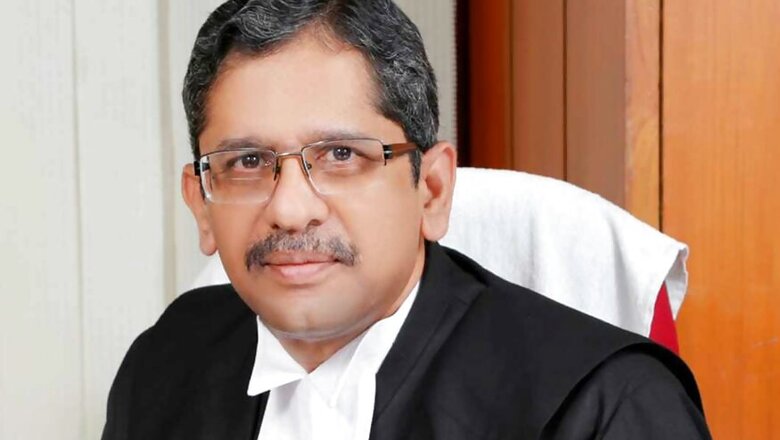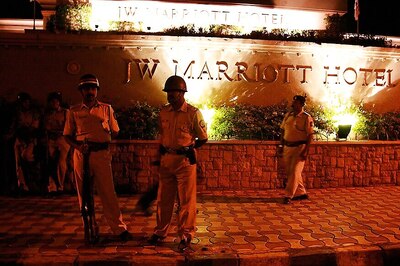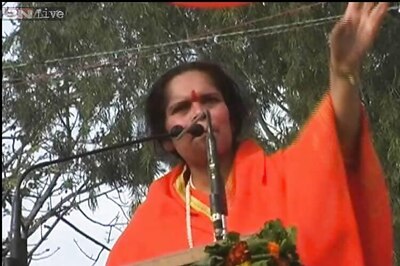
views
New Delhi: Justice NV Ramana, who on Thursday recused himself from the Supreme Court's in-house inquiry panel set up to examine the allegations of sexual harassment against Chief Justice of India Ranjan Gogoi, set forth the reasons that had forced him to take such a move.
The recusal came a day after the complainant, who has accused Gogoi of sexually harassing her on two occasions in October last year, wrote a letter to the panel expressing reservation over the inclusion of Justice Ramana. The committee is headed by Justice SA Bobde. Justice Indu Malhotra has now taken Justice Ramana's place on the panel.
The complainant, who is supposed to appear before the panel on Friday, objected to the presence of Justice Ramana on the ground that he is a close friend of the CJI and a regular visitor to his house. She had also raised question over the presence of only one woman judge — Justice Indira Banerjee — in the panel to examine her allegations against the CJI which is not in accordance with the Vishaka guidelines.
The complainant had said that as per the guidelines laid down by the Supreme Court in the Vishaka judgement, the committee holding an inquiry into the allegations of sexual harassment at a work place must have a majority of women.
Justice Ramana said his recusal should not be seen as evidence of any “transgressions”.
“My decision to recuse is only based on an intent to avoid any suspicion that this institution will not conduct itself in keeping with the highest standards of judicial propriety and wisdom,” he wrote in the letter. “Let not my recusal in the instant matter be taken to mean, even in the slightest of measures, that we have transgressed either of these principles.”
Justice Ramana dismissed the "baseless and unfounded aspersions on my capacity to render impartial judgment in this matter". He said that judges often meet the CJI in connection with administrative duties and responsibilities.
“I am, like any other judge of the honourable Supreme Court, required to attend official meetings at the home office of the Chief Justice of India. We, the judges of the honourable Supreme Court, regularly meet each other – including socially — and also the Chief Justice of India. In fact, we call ourselves a ‘family’ — to encapsulate that fraternity and collegiality,” he wrote.
Justice Ramana said his visits to the CJI’s residence do not suggest any proximity than what is absolutely normal under the circumstances. “Thus, the apprehension expressed by the complainant in this regard is wholly misconceived,” he said.
“Let my recusal be a clear message to the nation that there should be no fears about probity in our institution, and that we will not refrain from going to any extent to protect the trust reposed in us. That is, after all, our final source of moral strength,” he said in the letter.
Justice Ramana said the situation is "extraordinary" — both in terms of the nature of the complaint and also the events that have transpired subsequently.
"The growth of every institution is necessarily based on iterative steps and a re-evaluation of the same with the courage to make changes based on our best sensibilities — intellectual and emotional. Wisdom does not flow from unbending assertion of authority, but recognition of frailty and the need to safeguard institutional integrity," he said.
Justice Ramana also referred to the objections of the woman with regard to his recent speech on the occasion of Centenary Celebrations of the High Court Building at Hyderabad.
"As a part of a broad analytical and factual discussion of the topic, which included discussions about pendency of cases, use of technology and issues relating to the Bar, I also spoke about personal attacks against members of the judiciary seeking to cast aspersions on their ability to render impartial judgements," he said. If anything, the implicit assumption of that portion of my speech was that our conduct as judges ought to be exemplary so as to protect the dignity of the judicial institution from these frequent attacks. Judges, therefore, ought not to be
cowed down in upholding the dignity of the judiciary. The dignity of the judiciary, first and foremost, flows from the capacity of judges to render impartial justice."
Justice Ramana said his assertion, on the need to protect the dignity of the judiciary, was now being used to allege bias and it was "a sad reflection of the state of affairs".




















Comments
0 comment